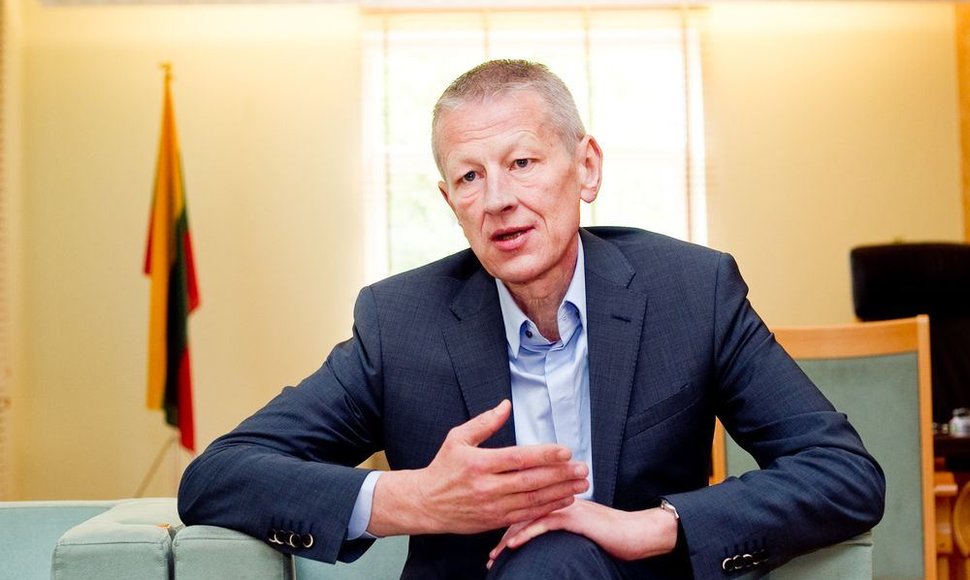The minister, 53, is nearing the end of his 4-year term, but the problems he has been charged with – waste disposal, thermal insulation of old housing, renewable energy development, sewage treatment – will occupy many of his successors.
- In April, a new bill on waste management and the debate that followed revealed problems in this area. Even though the Parliament took into account the President's veto remarks, the law still contains many flaws. How would you propose to improve the law?
- You cannot create a waste management system with one law and in one or two years. We seriously started with the task ten years ago. Much has been done: everyone knows how many old dumping grounds have been closed and new ones opened. One cannot deny that there are unsolved issues in the current system. Changes in legislation have been discussed for three years – that means there are things to discuss.
Waste management is under the purview of municipal authorities. The vetoed law was intended to include as many firms as possible into the process. Perhaps indirectly, but it did create conditions to monopolize the sector. In principle, waste management is a monopolized area. Upon the President's suggestion, the monopoly remains within the municipal purview.
However, the original wording of the law could have upset the old system that took ten years to build. One cannot destroy something that it took decades to create. Now, the legislation leaves enough room to make decisions one way or the other, to direct waste management in a positive way.
- And yet the current system does not encourage people to sort waste. Perhaps financial incentives could come in handy? The system of collecting old batteries has shown that Lithuanians are best motivated by money.
- Consciousness should not be a thing to buy. We all – private citizens and companies – produce waste and should therefore care about what to do with it. It's comfortable to put everything into plastic bags, but we should not forget that it is our responsibility to make sure the Earth does not turn into a vast dump. If you don't pay me, I'm not doing anything, even though I'm the one producing waste? It's doubtful that paying for everything would be a good way to go. People must see sense in what they do.
I don't think we should adopt a system where you bring waste and we buy it from you. To some types of waste – packages, bottles – this already applies. The Parliament has long been discussing container deposit fee on plastic bottles. But there's a downside – the deposit money must come from somewhere, it would mean prices going up.
- There is an equally heated debate on renovating old houses. According to experts, this could not only help save energy and cut down heating expenses, but also be a great stimulus for economic growth. How is the Ministry of Environment hoping to kick off the process?
- The Government has an entire paragraph dedicated to that in its programme and, by the way, it contains the figure 2000 (of houses to be renovated under the programme). No one really cares what it means. What was said was: financial opportunities would be created; the number also included educational institutions. The financial mechanism is in place, EU support is there.
There have been several programmes to update old blocks of flats. In 2004, a programme for renovation of blocks of flats was approved. Since the beginning of my term, over 230 buildings took part in the programme. There are 200 more applicants.
They say there have been no renovation works for the last four years. Let's go out into the street and see if there are no renovated houses. Not to mention public educational institutions. I inquired at the Ministry of Education how many schools had been renovated. To my surprise – and theirs – the answer was over 700. Not to mention hospitals and other public buildings renovated on the Ministry of Economy funds. 2 billion litas (580 million euros) was spent for renovation.
They say that the process has been slow due to flaws of the JESSICA model (according to it, the state fully subsidies renovation works for the less affluent). It is still better than the previous model, voluntary renovation, as it contains many more exemptions.
But why do people not use this opportunity? When we made public speeches in the beginning of the term, we made a mistake in that we stressed that renovation was a plan for economic recovery. When it comes to private property and a person must take on obligations, it was a big mistake to say that people living in blocks of flats were the ones to save our economy. This measure is intended to help people – it adds to their pockets.
- Lithuania is very serious about becoming energy-independent from Russia. While a new nuclear power plant is still some time away, we could use renewable energy sources. Is the state going to support it?
- At the moment, the cost of renewable energy is very high. Solar energy is being bought at 1.8 litas per kWh (plan is to lower it to 1.5); wind energy – 0.3 litas per kWh, while the base price for fossil fuel energy is 0.15 litas per kWh. If we switched to renewable sources only, we would have to pay very dearly for energy. It's something that we should move towards, but conventional energy production should still make up a sizeable share.
Wind energy has a normal economic return rate, it doesn't need much in state subsidies. Solar energy cannot ensure steady supply, one must willy-nilly connect to the grid.
A return for energy producers is simple: if production does not exceed a set limit, they must buy my energy at 1.8 litas per kWh after which I myself buy electricity from the general grid at 0.4 litas. This is business – what support are we talking about? If energy thus produced is being used for own consumption, not for sale, then there are subsidies from this year's Climate Change programme. And we encourage biofuel energy production.
- The latter, however, also faces a rather gloomy future ahead. Boiler-room builders forget to install furnaces suitable to burn straw and osier willows.
- That is true. The economic value of chopped wood is somewhat bigger. It's better to cut trees and shove them into furnaces without having to worry about green refuse, straw. There is so much straw in Lithuania that we could heat all houses. And there are very few boiler-rooms to process them and these are quite small. When you burn straw, there remain 20 percent of aches. Where do we put them? Furnaces and their upkeep are a little more complicated.
But these are details. There is a much bigger undercurrent there – such furnaces would increase competition. Why did they launch investigations into operations of some companies? We see a monopoly in the making. I've made some inquiries into whether it pays off to go into biofuel business in Lithuania – it does not. You'll be eaten alive: after setting up a company you will have an option to sell it to the majors or suffer economic losses. We have earmarked funding for production in our Climate Change programme. In Lithuania, wood refuse, branches, could amount to 750 thousand tons a year. The trouble is that forest administrations offer raw green mass and not processed material ready for burning. We presented 150 thousand tons to the market last year. Less than 100 thousand tons were actually bought. This year, we are offering 250 thousand tons – I don't expect to sell more than half of it.
It is good that they've recently passed the Law of Energy Resources Market. If we abolish the opportunity to buy [wood] directly from oneself – as it happens in some cities – and major energy producers are forced to use the trading market, we will be able to curb prices.
- EU budget for 2007-2013 envisages 4 billion litas for environment protection. Do we not just waste some of the money? For instance, what we do with silt from sewage treatment is drying it and burying it in ground. In Denmark, they use it to fertilize forests.
- It is not easy to use waste in agriculture in any country. When a consumer hears he is eating a product that was grown on sewage tilt, it brings to mind associations that are less than appealing. We are currently working on a mechanism to make that happen.













